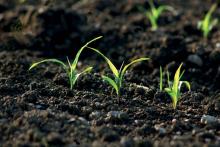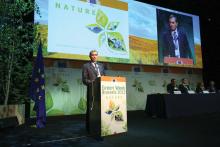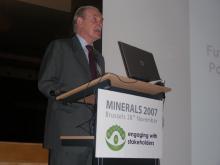The first ever EU Raw Materials Week has recently ended, but what did it entail and why was it so important? The UEPG (
Have you ever heard about green growth, nature protection, biodiversity, water management and ecosystem services? Most likely yes, as they have a prominent place in EU policies; not least thanks to the EU Green Week, the biggest EU Nature Conference, which takes place annually in Brussels and is surrounded by a number of satellite events across Europe.
Organised by DG Environment, Green Week is a magnet for non-governmental organisations (NGOs), Academia and Industry and provides a public platform for high-ranking EU Policy Makers such as vice president Timmermans and environment commissioner Karmenu Vella to deliver their message on the future EU environment policy.
Access to resources, best practice on land-use planning and permitting, geological knowledge, critical raw materials and waste management are tremendously important for our EU economy but do lack a comparable prominent place both in EU priorities and in the collective political mind of EU citizens. Just try to imagine any public consultation on an EU raw materials policy triggering more than half a million replies as was the case for the Natura 2000 Fitness-Check.
Giving the EU raw materials policy a prominent place
The gulf between public knowledge and official policy was probably one of the reasons for the European Commission’s Directorate General for Internal Market, Industry, Entrepreneurship and SMEs (DG Growth) to create the EU Raw Materials Week which took place 28 November to 2 December 2016. The main events in Brussels were accompanied by 14 satellite events across Europe.
One of the key events during the week was the 4th annual High Level Conference of the European Innovation Partnership (EIP) on Raw Materials on 1 December. This saw a distinguished panel stage a debate on raw materials beyond the common EU target of timeline 2020. Tomasz Husak, head of cabinet of Commissioner Elzbieta Bienkowska, for internal market, industry, entrepreneurship and SMEs, and the former industry commissioner and current vice-president of the European Parliament, Antonio Tajani, kicked-off the debate. To safeguard the continued sustainable supply of raw materials is truly an invidious task. If all goes well and the economy keeps rolling, nobody will notice.
Should the EU economy ever run short of raw materials with severe impacts on GDP, jobs and our living standards, expect big trouble. Fixing that kind of supply challenge cannot be done the next day. It takes years to safeguard the reserves in land-use planning and actually accessing this through often lengthy, complex and costly permitting procedures. Shaping the framework conditions and the policies which allow the annual European demand for 2.7 billion tonnes of aggregates to be satisfied requires the unremitting efforts the UEPG, the European Aggregates Association and its members.
The UEPG contributed to the EU Raw Materials Week by attending several relevant sessions. Dirk Fincke, UEPG secretary general, was also a key-note speaker at the MIN-GUIDE Annual Conference on 2 December, presenting ideas on “Creating an enabling business environment: Cornerstones of a favourable minerals policy framework”.
Preaching to the converted?
Hopefully not, but the staging of big events, conferences and numerous meetings does bear the risk of involving the same people time after time. This is why the UEPG supports the decision of DG Growth to invite a much broader range of stakeholders. Sustainable access to resources is not an exclusive remit of industrial policy. It has social and environmental aspects. The social licence to operate and the call to involve environmental NGOs and civil society do not only apply to companies and the local level, but also to the UEPG and the European Commission, the whole range of stakeholders in between.
More information on the EU Raw Materials Week is available on the %$Linker:







